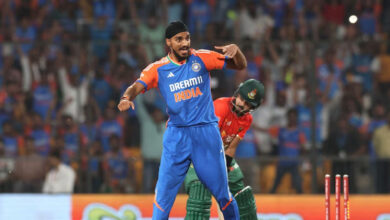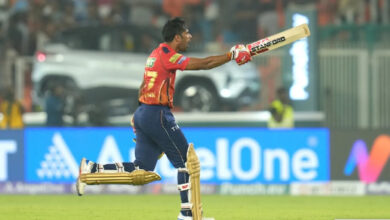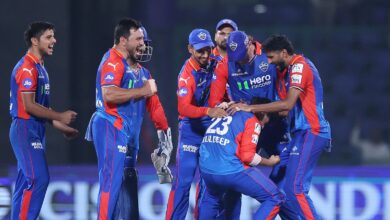PV Sindhu pours her heart out after Asian Games loss, gives example of Simone Biles and Naomi Osaka’s struggles | Asian-games News

Hangzhou: Until not so long ago, India’s most decorated badminton player, a serial winner and the ultimate big-game performer couldn’t be defeated.Now, she can’t win.
“This is the period when you go low at times. You don’t know what to do, what’s happening,” PV Sindhu says.
On Thursday, Sindhu lost again. A tame, straight-game defeat to China’s He Bingjiao in the quarterfinals brought the curtains down on her Asian Games campaign. A year ago, the manner of her surrender would have raised eyebrows.This time, nobody batted an eyelid. Not even Sindhu.
“Initially, when I was losing, it was like ‘what’s happening?’ A lot of things go on in your head. (You think) Why is it happening (even though) I am playing so well?” she says. “Now it’s going better.”
It’s not as if Sindhu has made peace with the losing feeling. It’s just that she’s starting to deal with it better. “I am sad after losing this match, it’s a bit upsetting. but it’s okay to lose at times,” she says.
Yet, it’s an emotion she’d rather not have experienced.
For almost a decade, Sindhu set the standard in Indian sport. A medal from her at a major event was taken for granted. In a country where most athletes are content merely with the tag of being an Olympian or simply competing at a World Championship, she showed how to win. Her five World Championships, two Olympic, five Commonwealth Games and two Asiad medals are a testimony to it.
But in India’s most successful Asian Games performance, with 85 medals and counting, there won’t be a Sindhu medal.“After winning (for) so many (years) and losing suddenly, it feels sad,” Sindhu says. “But it’s important to just be there and fight back and come back stronger, which I believe I can do.”
In the narrow corridor of the brightly lit basement of the Binjiang Gymnasium, Sindhu leans back and forth, smiling and reflecting on what has been a nightmare season.
It started with a stress fracture last year, en route to winning the Commonwealth Games gold medal. Sindhu was expected to return for the World Tour Finals that year, but after the doctors advised rest, she stayed away from the court for an extended period.
She finally made a comeback this year but on her return, Sindhu has looked a shadow of her stellar self.She’s not gone beyond the second round in nearly a dozen competitions this year, with most of them being facile first-round exits. On Thursday, He Bingjiao would pin her to the four corners and make her move around. Sindhu tried to counter it with speed and, to some extent, she succeeded in the first game. In the second, she couldn’t sustain the same momentum and the longer the rallies got, the more it looked certain that she wouldn’t win the point.
The shuttler who could once make a comeback from any position looked bereft of belief.
“After the injury, you don’t know if you have to believe in yourself, can you do it or can you not…” Sindhu says. “I know losses give you a lot of downfall. But you have to make sure you are in the right mental state and I have been focussing on that. At the moment, a lot of people are going mentally low because they keep winning and suddenly lose. So it’s human tendency to feel sad but it’s important where I have been focusing on the mental aspect as well.”
She speaks about the American gymnast Simone Biles and Japanese-American tennis star Naomi Osaka; two athletes who have endured similar lows after unprecedented highs.
At the Tokyo Olympics, Biles, one of the greatest gymnasts of all time, pulled out at the last minute, citing her state of mind. Osaka, the pre-Games favourite for the gold medal, lost in the third round and also spoke about the mental toll of her profession.
Sindhu saw that up close at the Tokyo Olympics, where she won a bronze medal. “All of a sudden she pulled out of the Olympics and it was a shock and even Osaka, the tennis player. They spoke about their problems, we are nobody to comment on that,” she says.
“But you have to speak it out and let them know you are going through this and you are not fine. It’s nothing wrong, there are people to help you. You can’t just keep it to yourself, that will cause a lot more depression. Rather you just speak it out.”
Mentally, she’s in a ‘good space’, Sindhu inss. But she’s surrounded herself with people with whom she can bounce off her thoughts and feelings; friends, families, a mental coach, athletes who have endured a dip in form and those who have come back from injuries.
“I have been talking to a lot of people, they’ve been giving me a lot of motivation. They tell me it’s okay, especially people who have injured themselves, coming back is a lot harder,” Sindhu says. Ratchanok Intanon, her Thai counterpart, was among the athletes she spoke to. “I also gave her my suggestions and passed her my good wishes.”Most Read
1
Asian Games 2023 Live Updates, Day 12: Antim Panghal wins bronze; Compound archery teams bag 2 golds; Silver for Saurav Ghosal
2
Shell hikes diesel prices Rs 20 a litre
See More
The belief is gradually returning. The partnership with new coach Muhammad Hafiz Hashim of Malaysia is developing fast, with the duo identifying areas where Sindhu needs improvement. “There are lots, not one or two,” she admits. “(But) I am getting better day day.”
She’ll next compete in the Super Series Finland, Denmark and France and the Asian Games quarterfinal is something of a building block after a series of disappointing early exits.
“Ultimate aim would be the Olympics, I am aiming for the third medal,” she says. “Before that, there are a lot of qualification tournaments. So to do well and be happy is what I want to do… stay injury-free, enjoy your sport.”From her current vantage point, it might seem a daunting task. But Sindhu sounds upbeat: “The dream never dies.”







